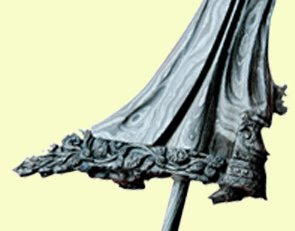Pamor is the true spirit of the Keris. The pattern welding work demonstrates the skills of the Empu but also characterizes the power of the blade.
The word Pamor means in Malay, mixture of alloys, and in fact the Pamor pattern is obtained by welding together wrought iron and nickel, and then acid etching it. The mystical power of the Keris is said to come from its celestial origin because of the use of meteorite iron. However, it is doubtful that many Keris blades were actually made of meteorite iron. The only fall of a meteorite in Java was recorded in the mid 18th century, near Prambanan. Since there was almost no natural iron deposits in Java, most probably most of the blades were made beforehand from imported iron. Sulawesi is said to have exported its iron which contains a low percentage of nickel, this type of metal is called Pamor Luwu, from the Eastern part of central Sulawesi. While using this nickelous iron, Javanese smiths found they could control specific pattern designs by etching the blade and creating a contrast between the darken iron and the bright nickel.
The Prambanan meteor was said to contain 9.4% nickel, which made it very attractive to smiths, but its scarcity restricted its use to top quality blades for wealthy owners.
The colonial presence brought, in the late 19th century another source of cheap nickel from scrap iron: bicycles frames, ship propeller, tools... These industrial metal parts contained up to 5% nickel and provided a very high contrast pamor with bright nickel. More recently pure Nickel has been used, thus recently forged blade show a very uniform shiny nickel.
It is interesting to note that most Sumatra, Peninsular or Moro blades are in plain iron, whereas most of Java, Bali and Sulawesi blades are in pamor: these later islands had an easier access to the Luwu ore.
http://old.blades.free.fr/keris/introduction/wilah/pamor.htm






